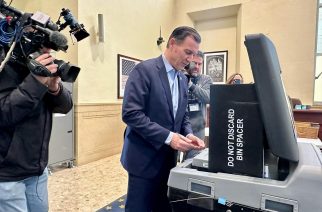League of Conservation Voters say Colgate Palmolive is actively fighting legislation
A bill on its third reading in the Senate would ban the sale of housewares, cleaners and health and beauty products containing triclosan, an antibacterial agent currently under review by the U.S. Food and Drug Administration. But advocates pushing the bill say Colgate Palmolive, which manufactures several products containing triclosan, is actively lobbying lawmakers to prevent the bill from passing this session.
The Triclosan Awareness Act (S.6636-a /A.9230-a) is sponsored in the Senate by Jack Martins, R-Mineola, and in the Assembly by Michelle Schimel, D-Great Neck. Concern over triclosan stems from current scientific research that suggests it can harm algae, plankton and other aquatic life.
Triclosan is an ingredient added to many consumer products such as soaps, deodorants, kitchenware and even cosmetic creams to reduce or prevent bacterial contamination. It may also be found in products such as clothing, furniture and toys.
“No question we need to ban this chemical,” Martins said at a recent press conference in Albany where he was joined by environmental groups supporting the ban. Martins called the use of triclosan “unnecessary” and said New York is “going to put families, children, and the environment first,” instead of allowing manufacturers to continue to use triclosan in their products.
Consumers, when using products containing Triclosan, typically dispose of the waste by pouring the chemical down drains, which later empties out into large bodies of water including rivers, lakes, and streams. This produces a series of environmental and health concerns ranging from algae damage, to contaminated irrigation water effecting crops, to animals being exposed to toxic chemicals, as well as a plethora of other problems.
In 1997, FDA reviewed extensive data on triclosan in Colgate Total toothpaste. The evidence showed that triclosan in this product was effective in preventing gingivitis. For other consumer products, however, FDA has not received evidence that the triclosan provides an extra benefit to health. The FDA says at this time, the agency does not have evidence that triclosan in antibacterial soaps and body washes provides any benefit over washing with regular soap and water.
Assemblywoman Schimel denounced the use of triclosan as she stood in front of a display of common household cleaning products and beauty products including Dial soap, Dawn dishwashing detergent and Noxzema face cream.
“Do the risks of using triclosan outweigh the benefits,” Schimel asked during the recent press conference in Albany. “Antimicrobial agents like triclosan belong in a hospital setting, not on your kitchen counter or as hand soap in your bathroom. With the help of our environmental and health advocates, New York stands poised to be the second state in the country to ban triclosan.”
Triclosan is not currently known to be hazardous to humans. But several scientific studies have come out since the last time FDA reviewed this ingredient that merit further review. Animal studies have shown that triclosan alters hormone regulation. However, data showing effects in animals don’t always predict effects in humans. Other studies in bacteria have raised the possibility that triclosan contributes to making bacteria resistant to antibiotics.
In light of these studies, FDA is engaged in an ongoing scientific and regulatory review of this ingredient. FDA does not have sufficient safety evidence to recommend changing consumer use of products that contain triclosan at this time.
“Triclosan is an all too common antibacterial compound that has been increasingly linked to a range of adverse health and environmental effects,” said Assembly Environmental Conservation Chair Steve Englebright. “Contrary to the notion that Triclosan protects consumers from harmful bacteria, just the opposite may be true: that Triclosan use leads to bacterial resistance and other negative health consequences, while threatening our fragile ecosystems and water contamination.”
The New York League of Conservation Voters reported Thursday that Colgate Palmolive is actively fighting this bill in Albany, as the current legislative session nears an end next week. A call to the company was not returned.
Bobbi Wilding, deputy director of Clean and Healthy New York, said many companies are downplaying their use of the chemical, but even small amounts are thought to be harmful to ecosystems, say environmental groups.
“We easily found 20 items containing triclosan in upstate and downstate stores. It’s important to highlight that many items are store brands or ‘off’ brands, which cost less or are sold in dollar stores to lower income people,” said Wilding. “While we are glad to see that some major manufacturers have reformulated to remove triclosan from their products, we’re disappointed that they continue to market ‘anti-bacterial’ additives where it has no appreciable impact on the cleaning power of the product.
“Triclosan doesn’t make families safer, [it] contributes to the development of ‘super bugs,’ disrupts hormones, and adds toxic dioxin and chloroform to waste water, threatening people and aquatic life,” Wilding continued. “It’s got to go.”
Minnesota has already banned the use of triclosan in most products sold there. Martins hopes New York will become the second state to ban it, “establishing New York as a leader when it comes to protecting families and the environment.”
In the Assembly, the bill resides in the Code’s Committee where it has been since May 10. In the Senate it has advanced to a third reading.










